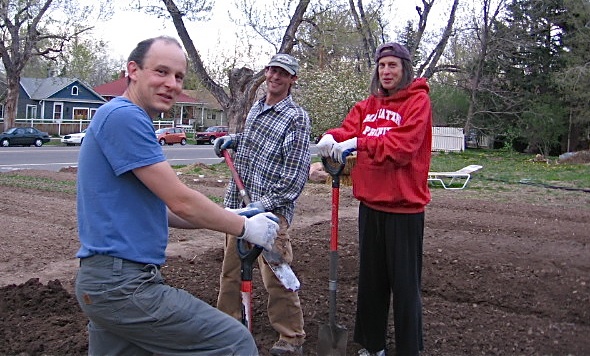Trading bluegrass for turnips
Rob Smoke | May 10, 2010

“Zero miles from garden to table – you can’t beat that.” Scott Hoffenberg, founding member of the Flatirons Neighborhood Farm, speaks with the passion of an urban farming evangelist.
The “farm,” which might otherwise be identified as a loose collection of neighborhood gardens in the area of Boulder just east of the foothills and south of Boulder Creek, has involved dozens of Boulder residents, including the student group “CU Going Local” and several homeowners willing to convert their bluegrass, or at least a portion of it, into collards, carrots, peas and turnips.
Economic-stimulus dollars pay for two part-time farmers; Scott’s research into funding sources led to his and friend John Maret’s grant application via the Boulder Housing Coalition. The Coalition acts as fiscal sponsor to the program “Hire Colorado,” which is a cache of Federal stimulus funds administered by Workforce Boulder County, the arm of the Colorado Department Of Labor and Employment that dispenses federal community project funding to qualified participants. (Applicants must have a child under 17 living at home and meet other requirements.)
If that sounds bureaucratic enough, the farming itself provides relief. The staff and volunteers (who include Scott’s wife, Wendy, pictured with “gangsta’ style” baseball hat) have recently been planting seeds and seedlings for spinach, lettuce, swiss chard, red and yellow onions, kohlrabi, peas and carrots -– crops that will offer a substantial discount on annual food costs. In addition, both Scott and John see the benefits as beginning with the sense of community developed through the twice-weekly “official” volunteer days, and the many informal small gatherings that neighborhood farms engender. Scott notes that it takes three years to transition from lawn to garden, so neighborhood participants — people exchanging their yard space for crop space — need to consider the required level of commitment.
Ironically, the farm would not exist if Scott hadn’t been embroiled with the City of Boulder for years over his “encroachment” into the public right of way with curbside gardens outside of his home. Motivated by the absurdity of a city advocating environmental sustainability while enforcing zoning codes that ensure the opposite result, Hoffenberg contested the charges, won the battle –- and then declared war. “It’s about bringing food closer to the people and people closer to one another and their food.”
The plantings can be found along University Ave. and include multiple curbsides, back and front yards, and one “permanently temporary” large yard at 7th and University. For further information, visit Flatirons Neighborhood Farm’s website.


